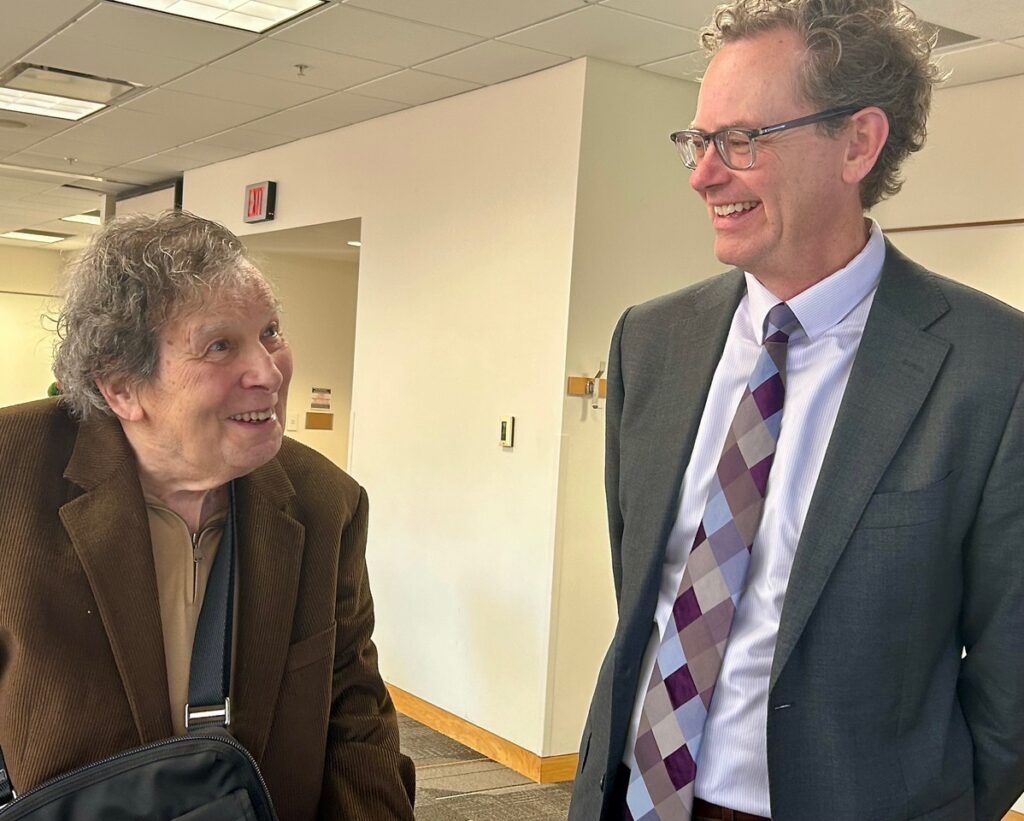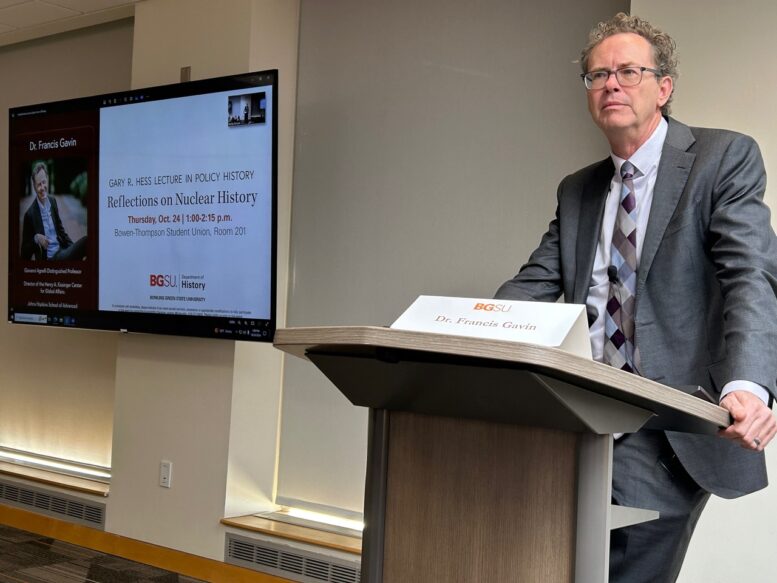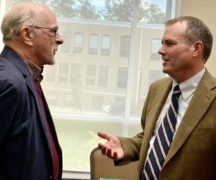By DAVID DUPONT
BG Independent News
Historian Francis Gavin said he could have delivered the Hess Lecture in Policy History at BGSU on any number of topics — new security challenges, American Grand strategy in a new age, the uses of history.
But Douglas Forsyth, the chair of the History Department, asked him to talk about nuclear strategy. In his introduction, Forsyth said because the prospect of a more isolationist foreign policy if Donald Trump is elected, this topic was now “top of mind.”
Gavin, a distinguished professor and and the inaugural director of the Kissinger Center for Global Affairs at John Hopkins School for Advanced International Studies, said he wondered about addressing an audience of students on nuclear weapons a “dreadful, terrible, awful topic” about which there is “not a lot of good news” on such a beautiful fall day.

Gavin said “I’ve been trying to break up with nuclear weapons for quite some time.” There is no escaping the topic. Living with nuclear weapons is like living in a haunted house, he said. The inhabitants know the ghost is there even if they don’t see it. “The ghost is out now.”
He was speaking 62 years from a time the world was on edge as The U.S. and the Soviets faced off during the Cuban Missile Crisis, the closest the world has come to nuclear war. And 60 years since China announced it had developed a nuclear weapon, and its leader Mao Tse-Tong declared given the size of its population, it could win a nuclear war.
And he was speaking less than two weeks before the presidential election.
Out of the Cuban Missile Crisis came the understanding on the part of the two nuclear powers, Russia and the United States, that nuclear weapons should be contained.
There are now nine countries with nuclear weapons — the United States, Russia, France, England, India, Pakistan, Israel, China, and North Korea. Iran is working on developing a weapon. Two countries South Africa and Ukraine gave up their weapons, though Gavin said Ukraine arsenal was never completely under its control.
Nuclear weapons, he noted, have only been used twice, both against Japan. The Manhattan Project that developed the bomb was started because of concerns about Germany and its research. The horrific result of the bombing of Hiroshima and Nagasaki gave policy makers pause, but did not halt further development.
Thermonuclear weapons are far more powerful than the weapons that were dropped at the end of World War II, he said. Ten weapons would be enough to decimate the continental United States.
At one point, Gavin said, it was possible to view nuclear weapons as useful on the battlefield. No more. They would completely destroy the place an enemy would want to conquer. Their only use is to deter the possibility that they would ever be used or to coerce other nations by threatening to use them.
Since the development of thermonuclear devices most of the technological development has been in how to deliver them — to miniaturize them, to make them faster, to make them harder to detect, and to make them more accurate.
The United States is in the midst of a $1.7 trillion, 30-year project to upgrade its nuclear arsenal, he said. The massive undertaking is little known and unexamined.
Fear of being invaded and conquered has always been what has driven nations’ policies. Yet, Gavin said, “no one is going to invade the United States. Rarely has there been a country that has less to fear of being invaded and conquered.”
The United States made the decision to spread its nuclear umbrella to protect its friends. The credibility of that threat, however, is widely questioned. Gavin said 80 percent of the books on his shelves address that question.
The argument is that the threat of nuclear weapons has deterred the outbreak of a third world war.
As a historian who studies what hasn’t happened as much as what has, Gavin now questions that.
Other factors have taken the pressure off — a decline in population that makes the need for land less pressing. And as the United States found out in Iraq and Afghanistan, conquest and occupation is expensive.
One lesson of history, he said, is that once an effective weapon is developed “good luck trying to keep it out of the hands of others.” Gavin explained: “Here’s a technology you know can do one thing — prevent states from invading and conquering you. Good luck trying to keep states from getting a technology that solves this basic problem.”
Even North Korea, a nation that struggles to feed its people, ”has some of the most sophisticated weapons and delivery systems in the world.”
Yet most experts in the 1960s would have been surprised to know that the number of nuclear states is so limited. “This is one of the great puzzles in my lifetime,” he said.
However if the United States leaves NATO and weakens its commitments with other countries that could very well lead to rampant nuclear proliferation as they replace protection from the American nuclear shield with their own arsenals. That’s one of the greatest consequences of the election.
The non-proliferation is based on a giant hypocrisy, Gavin said. Certain nations can have them while others cannot.
The costs of the current regime are increasing.
The United States has the most powerful conventional military in the world. It has the most dynamic economy. It has a culture that while puzzling is highly attractive to many people. “Nobody is banging down the door to emigrate to Russia or China,” he said. Yet “a world with nuclear weapons flattens American power,” he said.
North Korea having the bomb restricts what the U.S. can do in Asia. What would it mean if Vietnam or Indonesia had nuclear weapons? Would more countries having nuclear weapons strength deterrence or increase the chances of their being used?
In 2007, Henry Kissinger, George Shultz, Bill Perry, and Sam Nunn, all former to American foreign policy officials, asserted that the United States should revive the push to eliminate nuclear weapons. Then President Barack Obama made the same assertion in a speech in Prague in 2009.
Gavin noted that in the intervening 15 years the situation has gotten worse. “We are right now in the midst of this strategic nuclear arms race.”
The War in Ukraine, in which Russia has implied it could use its nuclear arsenal, has posed even more questions.
The threat of nuclear war is the issue no one wants to think about. But, Gavin told students, “it will be the most consequential issue in your lives.”



